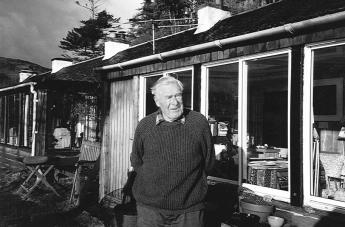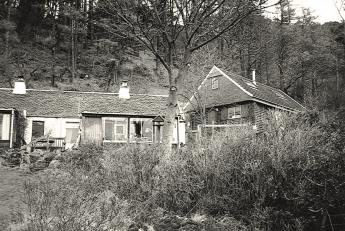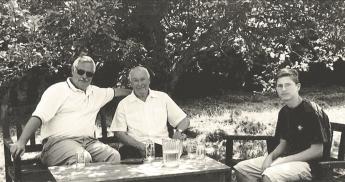Antiquarian Booksellers' Association of America
Books about Books: A History of Oak Knoll Press, Part 13: A Visit with Ruari McLean

By Bob Fleck
Another important stepping stone in our history occurred in 1997. The long saga of St. Paul’s Bibliographies reached the end of one era and the beginning of another as Robert Cross decided to retire and sold me his company. I was especially interested in the rights to bibliographies that he had tied up via his contracts and his large stock of unsold inventory. We sold a large portion of the Publishing Pathways inventory to The British Library and gave them UK sales rights for these and future projects, and I had a series of special sales to convert inventory into cash. Robert agreed to continue on in the role of a consultant, helping us find new titles and keeping old author friends in our camp. We had a splendid event in honor of Robert at Stationers’ Hall in London, where I felt a bit overwhelmed with the history of the grand building.
During this trip to England, I traveled to the wilds of Scotland to visit Ruari McLean (1917–2006) as I heard that he had some books for sale and that he had written his autobiography. Ruari lived on the Isle of Mull, which is a rugged island off the west coast of Scotland, so it was quite an adventure to get to him. He had retired from his life in the book production business and was spending his time writing books about various subjects, while still doing some typography projects. He lived by himself (his wife had passed away) in a desolate location on the coast overlooking the sea. Getting to the Isle of Mull required taking a train to Glasgow and catching another much smaller train to the coast town of Oban, where a 45-minute ferry ride got you to Mull. Getting to Glasgow from London was easy enough; however, Ruari had not looked at the train schedule closely enough for my Thursday trip to Oban. Trains don’t run to Oban on Thursdays! So back to the hotel I went and became a tourist in Glasgow for a day.
Friday proved more successful, and I found the small train and positioned myself at the window in preparation for a scenic morning trip through the countryside. Just before leaving, a young burly Scotsman staggered into my car bringing a large bag filled with cans of beer. He had obviously been enjoying the highlights of Glasgow and was now quite well prepared for his journey back to Oban. Much to the amusement of the other passengers on the train, my car-mate started singing old Scottish songs at the top of his voice with only brief pauses to refresh himself from the slowly diminishing supply of beer that he had brought along. Song after song was sung with no sign of slowing. Finally, the conductor came through the car, and I thought my concert was surely going to be ended. “Hi Jamie,” says the conductor, “I see that you have been having fun.” With that the conductor joined him in a song, and then left for the next car. Our concert continued until the beers were gone and sleep overtook my musical friend.
The ferry to Mull from Oban had spectacular views, and Ruari was there at the ferry dock waiting in his car to drive me to his home. We looked at books he had for sale all afternoon, though none turned out to be ones that I wanted. He had already either sold or given away most of his better books. However, he still had a number of manuscripts for books that he had written that were of interest to our publishing program. He cooked a meal for me that evening preceded with and ended by a selection of single malt scotches that I could not refuse out of politeness. The next day I have a hazy recollection of seeing the island of Iona before being put back on the ferry for my long trip back to London. I met him once more when Millie and I and our youngest son Rob went to Scotland for a two-week traveling holiday in 1999. We stayed at Traquair House, the oldest Scottish castle, for a few days, and Ruari drove down to have lunch with us. He was pressing me to publish his war memoirs, but I had to turn him down. Oak Knoll Press co-published How Typography Happens (Bib. #132) with The British Library in 2000 and co-published Ruari’s autobiography True to Type (Bib. #147) with Werner Shaw at the end of 2000.
To be continued …
Bob Fleck founded Oak Knoll Books in 1976 to fill a void in the booksellers world. Today Oak Knoll Books maintains an inventory of about 20,000 titles on books about books and a rapidly growing backlist of over 950 titles published and distributed under its imprint, Oak Knoll Press. Bob Fleck is ILAB President of Honour. He was ILAB President from 2002 to 2006. Each Friday the Oak Knoll Biblio-Blog publishes an excerpt from Bob Fleck's autobiography (“Books about Books“, published in 2008). The excerpts are also presented on ILAB.org. Thank you very much to Bob Fleck for giving us permission
>>> Read the whole story on ILAB.org
>>> The Oak Knoll Biblio-Blog
>>> Oak Knoll Books / Oak Knoll Press
>>> Robert D. Fleck, Books about Books. A History and Bibliography of Oak Knoll Press 1978-2008
>>> More about Bob Fleck on ILAB.org


